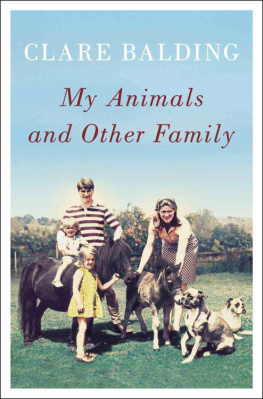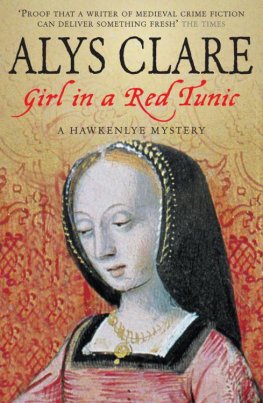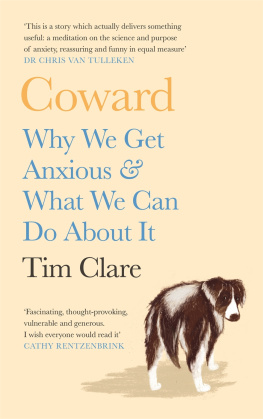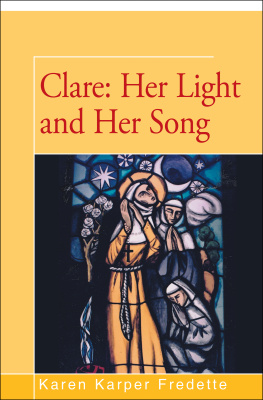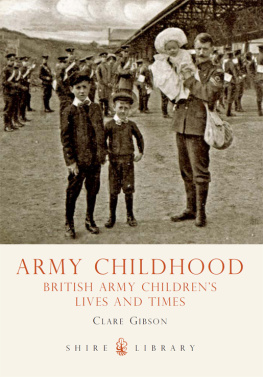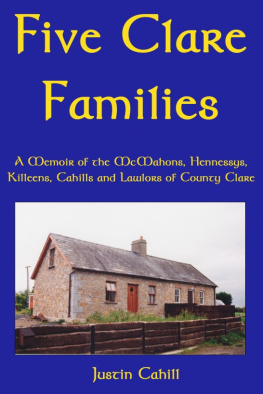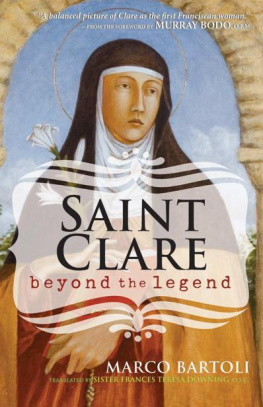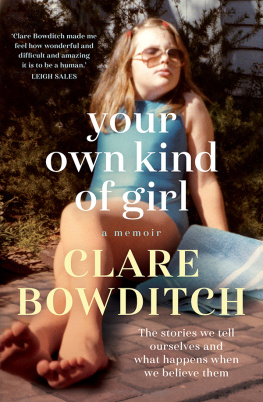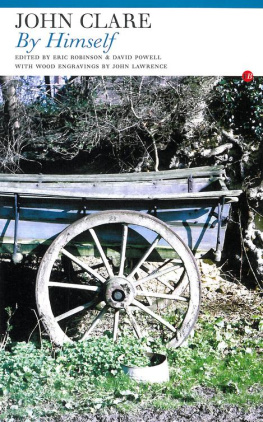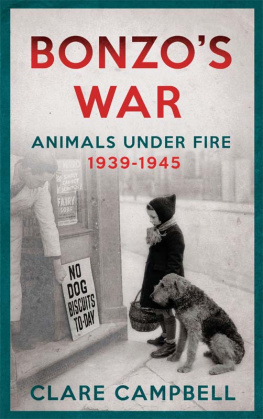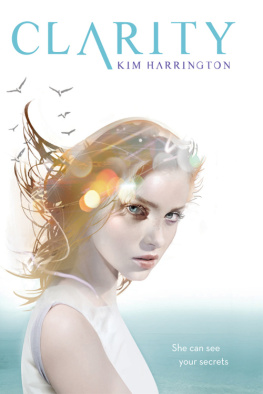CLARE BALDING
My Animals and Other Family
VIKING
an imprint of
PENGUIN BOOKS

Scan the QR code to hear an extract of My Animals and Other Family audiobook read by Clare Balding.
Contents
For Alice
Until one has loved an animal, a part of ones soul remains unawakened
Anatole France
Candy

The first face I can remember seeing was Candys. She was my protector and my companion, my nanny and my friend. A strong, snuffling, steady presence.
I looked into her big brown eyes, pushed my pudgy fingers into her cavernous wrinkles and smelt her stale breath. It was an all-in sensory experience. I was home.
I pulled her ears, lifted back her lip to examine her tiny teeth and gripped her rolls of fat, but she never snapped, never growled, never even gave me a warning glare. Candy was a saint and she knew her role in life. She was put on earth to guard me and she would, to the end of her days.
Candy was my mothers boxer, and the pecking order was clear in terms of affection and attention, Candy came first and anyone else, new baby included, came second. Candy loved my mother without question and my mother needed that from someone, even if it was only a dog.
Candy was what they call a red-and-white boxer: a deep-chestnut colour in her body, with a white chest, white around her neck and across her face. Her eyes sagged, her titties swung low and loose and her girth was wider than was strictly desirable. But as far as my mother and I were concerned, Ursula Andress could move aside she had nothing on Candy.
When she was excited, Candys whole body showed it. The move started in her stub of a tail and proceeded to her hips, which would rotate from side to side, making it virtually impossible for her to walk. Her body shook with delight and her lips drew back in an unmistakable grin. Most of the time she was rather matronly and sensible, but when she was happy, she was delirious.
I adored her and she responded with an immediate, unquestioning sense of duty. She would lie by my side, move if I moved and allow herself to be a living, breathing baby-walker as I used her to climb to my feet, wobbling on my plump, short legs as she pulled me gently forward. When the strain got too much and I collapsed on to a nappy-cushioned backside, she would sit and wait for me to get going again. She didnt much like other people coming near me, particularly men, warning them off with a withering glare.
Candy seemed to be the only one who was pleased to get to know me. The day that I first came back from hospital, Mum put the basket down on the floor and left me there. Bertie, the aloof lurcher with pretensions to grandeur, had a quick sniff, cocked his leg on the side of the basket and demonstrated exactly what he thought of it all. He stuck his head in the air and walked off, never to give me a second glance.
Candy, on the other hand, planted herself next to me, and there she stayed. It was a comfort, now I think about it, that she was so protective. You see, I was a disappointment from the minute I popped out, and there wasnt a thing I could do about it.
Oh, said Grandma, a woman routinely described as formidable, its a girl. Never mind, youll just have to keep trying.
Robust and six feet tall, my grandmother was a daunting presence. Her hair, neither long nor short, was done once a week by a woman called Wendy, who came to the house. Grandma wore no make-up, believing it to be for tarts and prostitutes. Her favoured formal uniform for race days was a raw-silk dress and matching coat, tailor-made to accommodate her unfeasibly large bosom, and non-patterned, because patterns accentuated the mountains. Sensible court shoes, a spacious handbag to hold wallet, glasses, diary and binoculars, the outfit topped off with a matching beret or in the summer a silk turban-style hat.
During the week Grandma would wear a calf-length skirt with a plain-coloured polo neck or cardigan. She never wore trousers. Once upon a time she had been a competent horsewoman, but she gave up riding when the side-saddle was discarded. She refused to countenance the idea of riding astride and did not approve of women wearing jodhpurs.
She didnt much approve of women, full stop, especially women with ideas above their station.
Grandma came from a family of statesmen, prime ministers and patriarchs. Her grandfather was the 17th Earl of Derby, but, as the daughter of his daughter, she would inherit little more than a nice collection of jewellery and a strong sense of entitlement. Her childhood had been split between a town house in London, an estate at Knowsley on the outskirts of Liverpool (now Knowsley Safari Park) and a villa in the south of France. Her mother, Lady Victoria Stanley, had died in a hunting accident when Grandma was just seven years old. Perhaps that accounted for her lack of maternal instinct.
None of the children got much attention, but the boys at least had the advantage of registering a presence. For the one girl in the line-up, early life was a losing battle.
My mother had had one staunch ally during her childhood years: her father. Captain Peter Hastings could trace his lineage back to the House of Plantagenet, which included Henry V and Richard the Lionheart. Deep in that family tree was also a mysterious link to Robin Hood. As far as my family are concerned, Robin Hood is not a fictional figure. He was Robert, Earl of Huntingdon.
He existed, and he still does. And not just in Hollywood films but in the middle names of my uncles. Every one of them is Robin Hood, and Uncle Willie William Edward Robin Hood is the 17th and current Earl of Huntingdon. It is a title that is worth very little in material value there is no stately home and no land to go with it but it has a certain historical magic, I suppose.
Uncle Willie, my mother and their two brothers did not see much of their parents. Nanny took care of the childrens everyday needs and a nursery maid was ever present. They got under the feet of Mrs Paddy, the cook, and mimicked Stampy, their butler. The household bristled with staff.
The children ate, played and slept in the east wing of the house. They were presented to their parents in the drawing room of the main house at exactly six oclock every evening: William, Emma, Simon and John, in that order. All present and correct. All sent to bed.
My grandfather is the reason that we lived at Park House Stables in Kingsclere, a village on the Hampshire/Berkshire border. His uncle was a brewery magnate called Sir William Bass. Sir William had no children and was concerned that the Bass name was threatened with extinction. So he asked my grandfather if he would consider adopting Bass into his own name.
Grandma was appalled.
I will not have any part of that common beer name, she said. You can if you wish, but let it be your business.
My grandfather duly changed his name by deed poll to Captain Peter Hastings-Bass, and all of his childrens surnames became Hastings-Bass. My grandmother steadfastly remained Mrs Priscilla Hastings. Most people called her Mrs Hastings. A few close friends called her Pris. Two naughty nephews dropped the r and got away with it, but woe betide anyone who called her Prissy.
I am not Prissy. Not to anyone!
In return for the adoption of the name, my grandfather inherited the Bass family fortune on Sir Williams death. In 1953 he used it to buy Park House Stables and the surrounding fifteen hundred acres on the southern outskirts of Kingsclere. It had the benefit of downland turf on Cannon Heath Down that had never in its history seen the blade of a plough. It was deep, lush, springy grass perfect for gallops. There were just over fifty stables, onsite accommodation for the employees and a house big enough for an expanding family and domestic staff.
Next page
